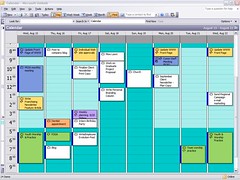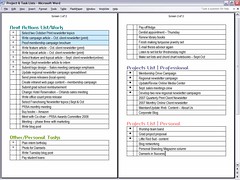 Gen-Y does a heck of a lot. This is the first post in a new series called, “Follow the Leader,” where you get the chance to peek into the professional and personal lives of fellow young leaders to learn how they get it all done. If you would like to be the next young leader profiled, email me.
Gen-Y does a heck of a lot. This is the first post in a new series called, “Follow the Leader,” where you get the chance to peek into the professional and personal lives of fellow young leaders to learn how they get it all done. If you would like to be the next young leader profiled, email me.
When I wrote my first post, it was Tiffany Monhollon (left) who contributed the first comment. Which made me giddy for days upon days and gave her instant status as my first bona fide blogging buddy. It only made sense to feature the talented writer of Little Red Suit as the first young leader to be profiled for the Follow the Leader series.
Check out the week of Tiffany Monhollon,
Writer and PR Professional, 25 years old:
(click twice to enlarge and sharpen Tiffany’s calendar and to do list for this week)
Tiffany says:
How to generate ideas
“I listen for themes in my life and let them speak into my work and my writing. I carry a notebook with me at all times and keep track of story, article, blog and graduate project ideas over dinner, while I’m sitting in traffic and when I’m shopping. I have anywhere from 15-30 ideas in progress pretty much all the time. I’m very curious about everything, so that helps.”
Balancing priorities is inherently lopsided
“My priorities often set me, to be honest. In theory, I should set priorities based on what I want to get the most out of in life – relationships, personal interests, family, and then spend my time focusing mostly on those things, right? But truthfully and frustratingly, I find that whatever is taking up my time finds its way to the top of my priorities in practice.
A lot of workers are faced with this reality. That’s why we talk about work/life balance so much. Our work dictates our priorities because it takes the most of our time. I try rather than to ‘set’ priorities, to just take an honest assessment of my time, and adjust that when it gets too lopsided. Otherwise, I would drive myself crazy and feel guilty all the time.
When I spend four hours instead of two on my blog, and ignore the important people in my life, I have to be honest with myself that I’m being really stupid. I have to look at where my priorities are right now by seeing where my time is invested, and then make decisions with my time to shift my priorities to what I want them to be ideally by spending time on them.
People who say family is their biggest priority and spend 70 hours a week working aren’t being honest with themselves.”
Time-management is a myth
“Though I talk about it a lot, time management is really a myth. It doesn’t exist, because you can’t control time. It passes, at regular intervals, despite us. Oh, how I wish this weren’t true! But it is, so we have to learn to manage ourselves in time. It’s really all about self-management.
I can’t tell you how many times in life I’ve heard or said some version of: ‘I don’t have enough time.’ But really, the truth is, you can plan on having the same 24 hours each day that everyone has, plan for your plans to be interrupted, and figure out how to manage yourself in that time that remains. That’s really the way it seems to work in real life, all theory aside.”
Aww…
What does Tiffany look forward to the most? “Spending time with my wonderful, supportive boyfriend any time I get to see him.”
What do you think?
Do you relate to Tiffany? Do your priorities set you? Are you constantly on? Do you like the Follow the Leader series idea? What are your ideas to improve it?


9 replies on “Follow the Leader – Manage your life like other young leaders”
Rebecca, Great Idea starting this!
Tiffany, on your ideas on time management, I am the ultimate multi-tasker and I do wear it as a badge of honor :)
I think multi-tasking has a bad rep though, mostly becuase when people think multi-tasking, they think “lack of focus”. I disagree with that saying that I (and many Gen-Y professionals) focus better by chunking tasks, coming back to them refreshed, and coming back to those tasks with an objective perspective. In that sense multi-tasking allows me to place more focus on each task as whole.
Does that make sense?
Rebecca,
Thanks again for this opportunty! I’m interested to see who’s featured next.
@Adam, I definitely get what you’re saying, but research actually shows that true multi-tasking makes us deliver poorer quality work. But, if you check out the post at Employee Evolution on Multitasking vs. Time Management and scroll to through the comments, you’ll see an excellent description of rapid task switching that better explains how this idea can work properly. That said, I still find it hard to switch out of multi-tasking mode, mainly because anything I do tends to remind me of something else to do!
I agree. I am an impossible multi-tasker. I’m hooked. But when I have something important to do, I enter the “flow” stage of work, which is what a lot of Gen-Yers do I think. How Gen-Y works will be one of my upcoming posts. I’ve also already signed up the next Follow the Leader for August 27th. Hooray!
Hi Rebecca, and thanks Tiffany for your insights. As a 47-year old baby boomer who has been in the business world for 25 years (yipes), I’ve been doing what I call “keeping the plates spinning” for nearly all of those years, and what I’ve learned is that as long as I truly do focus on what I chose to put in front of my brain at that moment, rather than really trying to “multitask” in the true sense of the word, I can do quite a bit of jumping around from thing to thing without much difficulty. In other words, you really can’t do more than one thing at a time, no matter how hard we try. I’ve called that “beast” that can pull our focus away the “Under Toad” (http://tshalffull.blogspot.com/2006/10/watch-out-for-under-toad.html).
If this “focus thing” can be somewhat mastered, you’ll find yourself actually liking the chaos of a life juggling many balls, and the lines between work and play will get blissfully blurred. That’s what happened to me (http://tshalffull.blogspot.com/2007/03/happiness-through-chaos-or-how-i.html).
On a more general note I like what you are trying to do in this series – sharing ideas and experiences is the best way to make personal breakthroughs in our lives. And yes, even a middle-ager like me can learn a few new things!
Keep up the great work here!
Do you all ever wonder if we’ve made up these words like multi-tasking and “flow” and Gen-Yer (where is the actual cutoff between Gen X and Gen Y by the way? Does it even matter?) just so it sounds more interesting when we talk about work and how we do it?
In the end i don’t think it is important to know the name of your work style or even be able to explain it as long as you’ve found the most efficient way to work for yourself (the one that gets the most stuff done whatever combination of jargon it amounts to). It is most likely going to be a mix of styles anyway.
I’m amazed at the quasi-industry that sprung up around the way people work, not what they’re working on but actually how they’re working . Shouldn’t the people devoted to this better apply their skills to something meaningful?
Shouldn’t the focus be on the important work that members of this generation are doing, not the style in which they’re doing it?
PS. I might be playing a bit of a devils advocate here for the purpose of the argument but as of now I sit firmly on the fence on the issue.
Brad,
Interesting question. I find that many people are on the fence about this topic and share many of the same questions. My original post on multitasking and time management at Employee Evolution was hotly debated, and a lot of people have a lot of opinions. When it boils down, of course, the actual work that we do is what matters, but in truth, how we get it done will impact its quality, timeliness and value. We need to face the truth of this reality. Many people in our generation simply don’t think about it, ever. Also, how we do what we do impacts how other people in other generations (whose help we need to advance in our careers, get more valuable assignments, etc.) view us and our abilities, so it’s important to consider even simply the perceptions other people have of how we work.
When it all boils down, we need to be completely honest with ourselves and, as you stated, figure out what works best for us as individuals, but I find that people tend to lean on multitasking or whatever their preferred work style is as a crutch, so they don’t even ever ask the question of what’s the best way to work. I always assumed that multitasking was a good, even vital, skill to have, but when I looked into the research and then evaluated my actual work habits, I found that it wasn’t really the “best” way to do things most of the time. But then again, there’s theory and there’s practice, because I still multitask a lot. Regardless, I am a lot more mindful of howI work now and I find that discipline helps me get more done. So the questions are worth asking, to me!
And to answer your question, there are also debates on when Gen X and Gen Y seperate, but most experts agree it was in the early 80s.
@ Starbucker- thanks for the tips and kind comments! I agree, and I think Tiffany does as well, that it’s hard not to have a lot going on at once so you learn to love it. I work better with lots of things to do as opposed to just one. My work and play lines have pulverized as I stated in a previous post. I’m rarely doing just one or the other anymore…
@ Brad- Tiffany stated it well, but I wanted to throw in my two cents as well. I think it’s absolutely necessary to know how you work. I recently had a meeting with a career coach and I thought it was going to be a bunch of bull, but it was incredibly useful. Being able to explain how I work, put a name to it, and recognize work styles in other people is ESSENTIAL in working effectively in a team environment. So while it is important to just get down to the nitty gritty and work, it’s also good to recognize differences and similarities and learn about those… Have you hopped over to my side of the fence or no?
I’m mostly on the side of the fence that it is necessary as a point of self-awareness. My biggest beef is with the consultants and others who make it their life’s work to analyze how others work without ever producing anything meaningful.
Though I guess it depends on how you define meaningful. I realize now that I think about it without really devoting time to think about it.
I suppose the major reason why it can even be a contentious issue comes down to semantics.
You comment about self-management struck me in an epiphany-like way. Excellent insight — thanks!